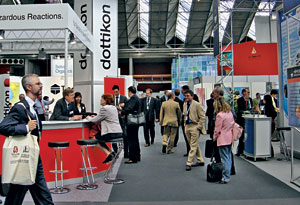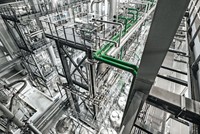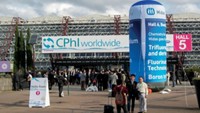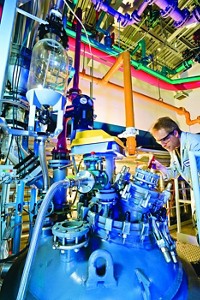Advertisement
Grab your lab coat. Let's get started
Welcome!
Welcome!
Create an account below to get 6 C&EN articles per month, receive newsletters and more - all free.
It seems this is your first time logging in online. Please enter the following information to continue.
As an ACS member you automatically get access to this site. All we need is few more details to create your reading experience.
Not you? Sign in with a different account.
Not you? Sign in with a different account.
ERROR 1
ERROR 1
ERROR 2
ERROR 2
ERROR 2
ERROR 2
ERROR 2
Password and Confirm password must match.
If you have an ACS member number, please enter it here so we can link this account to your membership. (optional)
ERROR 2
ACS values your privacy. By submitting your information, you are gaining access to C&EN and subscribing to our weekly newsletter. We use the information you provide to make your reading experience better, and we will never sell your data to third party members.
Business
Europe Rebounds
ChemSpec showcases a revitalized contract manufacturing sector and a growing role for private capital
by Rick Mullin
July 16, 2007
| A version of this story appeared in
Volume 85, Issue 29

PHARMACEUTICALS loomed large at ChemSpec Europe, the annual specialty chemicals exhibition, in Amsterdam late last month. Much of the discussion on the show floor centered on the flow of private equity money into the contract manufacturing of active pharmaceutical ingredients (APIs) as European firms restructure, spin off operations, or reconstitute themselves apart from former parent companies.
Private investors have traditionally played a role in the chemical industry, but they have not been very active in the risky contract fine chemicals manufacturing sector, where gaining or losing a single contract can have significant impact on a supplier's revenue. But private investment has picked up with the return to profitability for contract API firms following a prolonged, industrywide slump. Recently, for example, private equity firm International Chemical Investors bought a clutch of fine chemicals plants from Cambrex, Rutgers, and Albemarle.
"There seems to be a competition between private equity and small firms looking for acquisitions, but there also seem to be two philosophies," said Fr??d??ric Gauchet, chief executive officer of France's Minakem and among the approximately 6,200 ChemSpec attendees. The small firms, he says, are trying to rebuild the European fine chemicals sector, while private equity firms are looking for capital gain.
Minakem, which did not exhibit in Amsterdam, was itself formed with the acquisition of NuPharm's SEAC contract manufacturing assets by Gauchet and other private investors. The firm subsequently acquired Chemtec Leuna from Schenectady International. Two years ago, Gauchet observed, it was difficult to get the financing to buy a firm such as SEAC, but now investors seem eager to invest.
However, Gauchet and others question the wisdom of private equity firms that typically purchase a company in the red, turn it around, and sell it at a profit in three to five years. Such an investment model, they claim, does not fit the highly technical and often erratic business of manufacturing chemicals under contract with drug companies.
At ChemSpec, French fine chemicals maker Isochem presented what Xavier Jeanjean, head of pharmaceutical chemicals, called a more focused portfolio after the recent sale of its North American fine chemicals operation, VanDeMark, the only U.S. producer of transportable phosgene, to private equity firm Buckingham Capital Partners.
SNPE, the state-run French chemical and explosives firm that owns Isochem, has stated that it is looking for a buyer for the rest of its fine chemicals business, which has exceeded its sales target for the second year in a row, according to Jeanjean. Like many in the sector, the company had experienced several down years, and it recently restructured its manufacturing and R&D operations.
Jeanjean said VanDeMark largely operated outside the pharmaceutical market, supplying coatings manufacturers, for example, with p-toluenesulfonyl isocyanate. Isochem will continue to make phosgene for agricultural chemical applications in Kazincbarcika, Hungary, and will maintain its Isochem North America marketing operation in Princeton, N.J.
"The good news," Jeanjean said, "is that the fine chemicals business has dramatically improved. But where a good opportunity arises for a buyer for Isochem, SNPE will sell it. Their goal is clear."
JUST BEFORE ChemSpec, French chemical maker Orgasynth completed the sale of its fine chemicals and dyes group to the private equity firm Argos Soditic. The deal was coordinated by the fine chemicals group's new CEO, David Simonnet, the former head of pharmaceuticals at Isochem, who joined Orgasynth as general manager last year. Orgasynth will retain its core flavors and fragrances business.
The new company, Axyntis, will have annual sales of about $110 million and manufacturing at four sites in France. Simonnet said the firm will conduct 40% of its work in pharmaceuticals, 13% in electronic and agricultural chemicals, and the rest in dyes and other fine chemicals. Its goal is to conduct innovative chemistry in low-cost facilities.
"To develop this kind of business, you need to be an independent, privately owned company," Simonnet said. The high level of risk involved with API manufacturing, the need for speed, and the importance of close customer relationships favors mid-sized players, he said.
The new company will target business with emerging drug companies as well as with major drugmakers, Simonnet said. Other near-term goals include the launch of two or three new generic APIs and the acquisition of a firm with technology synergies.
According to Simonnet, private investor interest in the sector has grown following the departure of diversified chemical companies such as Clariant and Rhodia. Rather than a quick three-year turnaround on investment, companies like Argos Soditic are committed to longer-term involvement in order to expand businesses, he claimed.
Rohner, the contract chemicals division spun off by Novasep in the wake of Novasep's merger with Dynamic Synthesis, exhibited at ChemSpec under its new owners, the private equity firm Arques Industries. Novasep had indicated it might close Rhoner, which had struggled for several years to bring business to a new eight-story facility in Pratteln, Switzerland. Arques, however, saw a chance to restructure and expand, according to Daniel Pedrett, Rohner's newly appointed CEO.
Pedrett, whom Arques brought in from outside the chemical industry, reported that Rohner has closed two sites, eliminated low-margin commodity products from its portfolio, and reduced staff from 260 to 140 workers. "We have also added our own direct sales and marketing force," he said. "Today, we have a clear view of which customers we are interested in. It's a new start."
With annual sales of about $68 million from two plants in Pratteln, Rohner is concentrating on APIs, pharmaceutical intermediates, and electronic chemicals. Pedrett said the firm will pursue growth markets such as functional polymers and nanomaterials. A particular strength, he added, is transfer metal catalysis.
Getting the new facility's operating rate up to 60% of capacity has pushed the current staff to its limit, Pedrett said. Rohner is hiring again, he added, and employment will reach nearly 200 by the end of the year.
Arques is an investment firm that "focuses on companies in special situations," Pedrett said, such as "companies spun off by conglomerates that consider them noncore." The firm, however, is not gunning for a quick cash-out. "We have no exit strategy," he declared. "First, we need to see if the company will be a success."
Another new privately owned fine chemicals player is Dottikon, the former API manufacturing wing of Switzerland's EMS Dottikon. Since being spun off from its parent in 2005, Dottikon has invested about $2.5 million on a 25% expansion of R&D and a 20% enhancement of low-temperature synthesis capabilities.
The company has been focusing on developing its niche in hazardous chemistry, according to Max Bachmann, senior vice president for business development. "There is an increasing demand for hazardous chemistry and for process development in general," he said. Dottikon has also been cutting low-profit products from its portfolio.
With sales of $112 million last year, Dottikon is growing at about 3% annually, Bachmann said. About 73% of the company's business is in pharmaceuticals, with a third of the revenue coming from custom API manufacturing.
GENERALLY, fine chemicals producers at ChemSpec reported good business conditions, and many claim to have their eyes open for acquisitions. British manufacturer Contract Chemicals increased sales 20% last year to about $40 million, largely on the back of one large contract, according to Michael Holding, managing director. The firm has completed a $1 million, two-year investment in handling facilities partly to support the introduction of bulk and packaged acetyl chloride, he noted.
Holding said the firm has been on the lookout for acquisitions, "but it's a difficult industry. Matching value expectations to what a business is actually doing is a hard thing to get your head around. But we are looking for the right opportunity."
France's PCAS has considered an R&D acquisition in the U.S., according to Joseph Tessier, the firm's vice president of sales and marketing for North America. "Something similar to Hovione's," he said, referring to the Portuguese firm's R&D center in New Jersey. According to Managing Director Vincent Touraille, PCAS is also interested in technology alliances similar to PCAS Biosolutions, a joint venture with the French biotechnology firm Protéus that combines the latter's technology with PCAS's synthesis know-how.
Meanwhile, Touraille said the company is concentrating on supply-chain management and lean-manufacturing initiatives. "The main point is to improve our planning," he said, adding that PCAS recently replaced three separate business management systems with JD Edwards enterprise resource planning software. He added that a next step may be expanding some plants that are running near capacity.
Michael Hassler, director of business development for AllessaChemie, a German fine chemicals producer spun off from Clariant in 2001, says business is picking up, notably in personal care markets. Growth for the firm, with annual sales of about $390 million, "has been stable," he said.
Hassler noted that AllessaChemie inherited large processing vessels originally used in Clariant's dyes and pigments operations. The economies of scale they provide have aided the company as it competes with Asian firms for business with agricultural chemical companies that are closing plants and increasing outsourcing of chemical intermediates, Hassler said.
He claims that competition with low-cost producers in China has been tilting slightly in favor of Western producers in recent months. "China's tax refund for exports has been cut by 8%," he said, "and the exchange rate is slowly shifting in our direction. China's energy costs are going up, and intellectual property is still an issue. Many large customers are taking a different approach to Asia."
China was also on the mind of Denis Geffroy, senior business manager for Europe at Northern Ireland's Almac Sciences, who attended the show to meet suppliers of intermediates. "We are looking only at China," he declared. Almac, according to Geffroy, has used Chinese manufacturers before, primarily through middlemen, but is now interested in dealing directly with about 10 preferred partners. His job is to create the list.
Given that Almac's contract manufacturing business is currently running near 100% capacity, Geffroy said, raw material supply reliability is critical. "Right now, if one raw material is late by two weeks, there is a tremendous knock-on effect," he said.
Establishing a clearer view of the chain of supply from China is a daunting task, however; at ChemSpec this year, about half of the 386 exhibitors were Chinese companies. "It's like finding a needle in a haystack," Geffroy said. "It's hard to know who you are dealing with."
Despite the big Chinese presence, several European executives at ChemSpec contended that the pharmaceutical industry's love affair with Chinese manufacturers may be fading. Orgasynth's Simonnet, for example, said many companies have had bad experiences with quality and reliability when outsourcing to Asia, especially China.
In his view, such a change in sentiment couldn't be happening at a better time. The major drug companies continue to downsize their manufacturing capabilities, Simonnet said, and a revived European contract manufacturing sector, made up of small and newly aggressive companies, is ready to vie for the business.





Join the conversation
Contact the reporter
Submit a Letter to the Editor for publication
Engage with us on Twitter